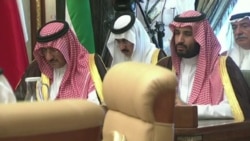Saudi Arabia’s willingness to wield its oil money on the global diplomatic stage appears to have been laid bare, after the website WikiLeaks published tens of thousands of leaked cables from Riyadh’s Ministry of Foreign Affairs. WikiLeaks has not revealed its source, but a group calling itself the "Yemen cyber army" has claimed it hacked government servers.
In one of the most conservative and secretive kingdoms on Earth, the leak of thousands of confidential diplomatic cables has caused shockwaves in Riyadh.
The documents appear to simply confirm widely held suspicions, according to Jane Kinninmont of London-based policy institute Chatham House.
“The leaks seem to be confirming most people’s existing assumptions and beliefs that Saudi Arabia has a number of politicians in other countries effectively on its payroll. And that they wield significant influence in the Arab media also through financial means,” said Kinninmont.
'Checkbook diplomacy'
One diplomatic cable suggests Saudi Arabia bailed out a bankrupt Lebanese television station for $2 million, in return for positive media coverage. The cables suggest Lebanon is being used as a key battleground between Sunni Saudi Arabia and Shi’ite Iran.
“Some of the details may be embarrassing. Not necessarily so much for the Saudis as for the recipients of the money,” said Kinninmont.
The fear of exposure could drive Saudi’s allies away from its so-called "checkbook diplomacy," said Arab affairs analyst Abdel Bari Atwan.
“Many people will think not just twice, maybe 10 times, before they are asking for the Saudi money or accepting the Saudi money, Saudi gifts,” said Atwan.
Another cable purportedly accused Qatar of giving $250 million to an influential sheikh in Yemen in return for fomenting an army rebellion in the country during the 2012 election of President Abdu Rabu Mansour Hadi. Saudi Arabia is currently conducting a bombing campaign against Houthi rebels in Yemen.
Saudi Arabia’s main priority will be finding out who made the leak, said Abdel Bari Atwan.
“How those hackers managed actually to reach the Saudi files, and to hijack or to put their hands on these huge documents,” said Atwan.
Fear of exposure
It likely will result in a dramatic tightening of online security, said Kinninmont.
“Saudi Arabia’s already very concerned about cybersecurity. They have had a cyber-attack previously on [oil company] Saudi Aramco. And I think this will be another wake-up call,” she said.
Analysts say the leaked cables do not contain any shocking revelations, such as funding Sunni extremist groups fighting the Iran-backed government of Syria.
“So far no indication that the foreign ministry has been involved in sending resources to Jabhat al-Nusra or to Islamic State in Syria," said Kinninmont. "It talks about their overt and public support for the SNC [opposition Syrian National Council]. But in any case, any such support would not be likely to go through the foreign ministry channels; it would be more likely to be covert.”
WikiLeaks says more cables will be released in the coming weeks, raising the potential for the diplomatic dealings of this secretive state will be further exposed.





